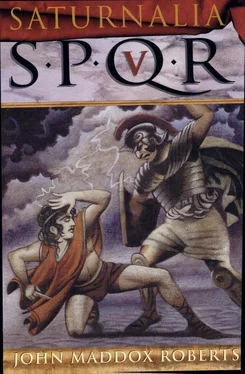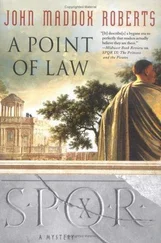John Roberts - Saturnalia
Здесь есть возможность читать онлайн «John Roberts - Saturnalia» весь текст электронной книги совершенно бесплатно (целиком полную версию без сокращений). В некоторых случаях можно слушать аудио, скачать через торрент в формате fb2 и присутствует краткое содержание. Год выпуска: 0101, ISBN: 0101, Издательство: St. Martin, Жанр: Исторический детектив, на английском языке. Описание произведения, (предисловие) а так же отзывы посетителей доступны на портале библиотеки ЛибКат.
- Название:Saturnalia
- Автор:
- Издательство:St. Martin
- Жанр:
- Год:0101
- ISBN:9780312320188
- Рейтинг книги:4 / 5. Голосов: 1
-
Избранное:Добавить в избранное
- Отзывы:
-
Ваша оценка:
- 80
- 1
- 2
- 3
- 4
- 5
Saturnalia: краткое содержание, описание и аннотация
Предлагаем к чтению аннотацию, описание, краткое содержание или предисловие (зависит от того, что написал сам автор книги «Saturnalia»). Если вы не нашли необходимую информацию о книге — напишите в комментариях, мы постараемся отыскать её.
Saturnalia — читать онлайн бесплатно полную книгу (весь текст) целиком
Ниже представлен текст книги, разбитый по страницам. Система сохранения места последней прочитанной страницы, позволяет с удобством читать онлайн бесплатно книгу «Saturnalia», без необходимости каждый раз заново искать на чём Вы остановились. Поставьте закладку, и сможете в любой момент перейти на страницу, на которой закончили чтение.
Интервал:
Закладка:
“The murder was reported by one Urgulus …”
“I have spoken with him,” I said.
“Then you know the circumstances under which she was found and I was summoned. I went to the Flaminius and found the body of a fairly stout woman in her thirties or forties lying in a large pool of blood. The cause of death was a deep knife wound to the throat, nearly severing the head. Questioning revealed no witnesses to the deed, which had occurred several hours before, judging by the condition of the body.”
“Were there any other wounds?” I asked. “Urgulus was unsure.”
“While I was asking questions, the Marsian women prepared her for transport to her home for burial. They took off her bloody gown, washed her body, and wrapped her in a shroud. I saw no other wounds, but I suppose if she’d been knocked on the back of the head with a club there might have been no obvious sign of it.”
“No evidence found nearby? The murder weapon, that sort of thing?”
“In that district? Thieves would have stolen the blood if they could have gotten anything for it.”
“That is so. Anything else?”
He thought for a moment. “No, that is what I reported. As I said, there was very little to report. When I went to court that morning I made a brief mention of it for the morning report.”
“Yes, I found that at the tabularium . Tell me, Caius Licinius, weren’t you in Gaul a few years back?”
“Yes, it was four years ago, when Cicero and Antonius were consuls. I was legate to my brother, Lucius. I was left in charge when he returned to Rome for the elections. Why, were you there at the time?”
“No, it’s just that Gaul is on everybodies’ minds these days.”
“It may be on everybodies’ minds, but it’s in Caesar’s hands now, though he may come to regret that, and serve him right.”
“You favor Pompey then?”
“Pompey!” he expressed utter scorn. “Pompey is a jumped-up nobody, who earned his reputation over the bodies of better men. And before you ask, Crassus is a fat sack of money and wind who once, with help, beat an army of slaves. Is that satisfactory?”
“Eminently.”
“Those men want to be kings. We threw out our foreign kings more than four hundred years ago. Why should we want a home-grown variety?”
“You are a man after my own heart,” I told him. Indeed he was, if his sentiments were sincere. I took my leave of him and walked away, pondering. He was not what I had expected, but it is always foolish to expect people to fall into one’s preconceived notions. He certainly seemed plausible, even likable. But Rome was full of plausible, likable villains.
Flavius had been more the sort of man I expected to find involved in this: the kind of brutally aggressive tribune who made the lives of the senior magistrates such a torment. That made me want to believe that he was a part of the plot to poison Celer, and that, too, was a foolish line of thought. The will to believe is mankind’s greatest source of error. A philosopher told me that once.
I felt that I had come to a dead end and had learned all I was going to by asking questions. The year was dwindling, and I had satisfied no one. All I had really determined was that Celer had indeed been poisoned. Clodia’s guilt or innocence was unproven. Clodius would be growing impatient. So would the leaders of my family. Gaul was looking better all the time.
“Up so early?” A small, veiled figure stood at my side.
“Julia! I’ll have you know I was up before dawn … well, not long after dawn, anyway, and working diligently. How did you get away from Aurelia?”
“Grandmother is never quite well on the day after Saturnalia. Waiting on slaves upsets her.”
“How very un-Roman. I expect greater respect for our traditions from our distinguished matrons.”
“I’ll be sure to tell her that. Where can we talk?”
“There is no shortage of places. The Forum isn’t exactly thronged this morning.”
We ended up on the portico of the beautiful little Temple of Venus on the Via Sacra near the Temple of Janus. Like that of Vesta, Venus’s temple was round, in the shape of the huts in which our ancestors had lived. The place was deserted, for the goddess had no rites at that time of year. The portico was newer than the rest of the building and featured a long bench against the wall of the temple, where citizens could sit and enjoy the shade on hot days, which are numerous in Rome.
From where we sat, we could see the doors of the Temple of Janus. We could see one set of doors, I should say, for that temple has doors at each end. The doors were open, as usual. They were only closed in times of peace, when Roman soldiers were nowhere engaged in hostilities. This is to say that they were never closed.
“Now tell me what you’ve been up to,” Julia said. It seemed to me that she was growing all too accustomed to making such demands.
“The hours since we parted yesterday evening have been eventful and more than a little puzzling,” I informed her.
“Tell me. I can probably make more sense of it than you.”
I began with the meeting in my father’s house after the slave banquet. Julia frowned as I described the proceedings.
“You mean they treated that … that atrocity as if it were just another little political embarrassment?”
“These men look at everything that way,” I affirmed.
“But my uncle is pontifex maximus! How can he treat this flouting of our sacred laws so lightly?”
“My dear, the supreme pontificate has become just another political office. Caius Julius is widely known to have secured it through a campaign of bribery such as has seldom been seen in Rome, even in this decadent era.”
“I cannot believe that. But I confess to being shocked at his cavalier treatment of the matter. It must be that the Gaulish campaign weighs so heavily on his mind. I know what a burden it is, spending as much time in his house as I do. Lately he has been agitated and busy from long before dawn to long after dark. He just calls for lamps and keeps on working, interviewing prospective officers, dispatching letters all over … he has become distracted with work.”
“I can imagine the shock,” I said. Caesar had long been famed for his indolence. The sight of him actually working had to be a worthy spectacle. “It seems that I may be one of those lucky men who shall go out and win undying glory for him.”
“What?” Now she had to hear all about that.
“It’s true. He asked for my services and my father thinks it’s a good idea and now I’m cornered. I may spend the next few years among the barbarians, constantly under attack and eating the worst food in the world.”
“This is disturbing news,” she said. From somewhere within her mantle she produced a palm frond and fanned herself with it. In December. She had probably overdone it in disguising herself with cloaks and veils. “But surely he will assign you to administrative duties … embassies, payrolls, that sort of thing.”
“He’ll have quaestors for the payrolls,” I told her, “and embassy or envoy duty can be dangerous in that part of the world. Nations wishing to join a rebellion usually declare their loyalty by killing their Roman ambassadors. Envoys who deliver terms the Gauls don’t like are often slaughtered. The Germans are rumored to be even worse.”
“Well, I am certain that my uncle will keep you well away from danger. Your reputation has never been that of a soldier, after all.”
“I am touched by your faith.”
“Anyway, that is next year. What happened after the conference?” This time she got the story of my flight from my father’s house and the little battle near my house.
“It’s a good thing Milo assigned you such capable men,” she commented.
Читать дальшеИнтервал:
Закладка:
Похожие книги на «Saturnalia»
Представляем Вашему вниманию похожие книги на «Saturnalia» списком для выбора. Мы отобрали схожую по названию и смыслу литературу в надежде предоставить читателям больше вариантов отыскать новые, интересные, ещё непрочитанные произведения.
Обсуждение, отзывы о книге «Saturnalia» и просто собственные мнения читателей. Оставьте ваши комментарии, напишите, что Вы думаете о произведении, его смысле или главных героях. Укажите что конкретно понравилось, а что нет, и почему Вы так считаете.









